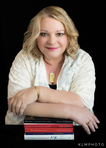Christy K. Robinson's Blog: William & Mary Barrett Dyer--17th century England & New England, page 21
March 6, 2012
Did education drive Miss Yale crazy?
© Christy K. Robinson
When asked how much educated men were superior to those uneducated, Aristotle answered, 'As much as the living are to the dead.' ~Diogenes Laetius
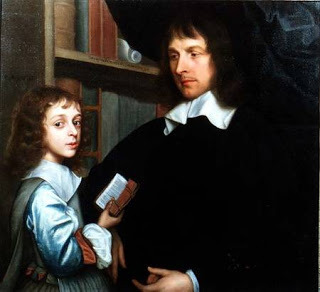 1645--Lady Mary Fairfax,
1645--Lady Mary Fairfax,
being tutored by her father, General Thomas Fairfax,
third Baron Fairfax of CameronStunning statements about education have come to light inthe last few months. One presidential candidate said that America needs "aleader, not a reader." Another said that the desire to educate more Americansis snobberyand "There are good, decent men and women … that aren't taught by someliberal college professor, trying to indoctrinate them. Oh I understand why hewants [you] to go to college. He wants to remake you in his image." A radiocommentator who flunked out of college after two semesters said that a female "authorette"with a recent BA degree and a journalism award for her first book was "over-educated."
In the 1600s, higher education was prized, and boys andyoung men were trained in science, literature, history, religion, and liberalarts. After the home-schooled Anne Hutchinson defended herself so eloquently andbested themagistrates in debates at trial in November 1637 and March 1638, Massachusetts established Harvard Collegeto train its teen boys to the ministry.
New England women guidedthe household, but remained subject to their fathers' or husbands' authority.Men believed women had the mental capacity to manage large households, manychildren and servants, and often a cottage industry like brewing beer,seamstressing, or cooking, but apparently not to be formally-educated women whodiscussed theology, as did Anne Hutchinson and later, Mary Dyer.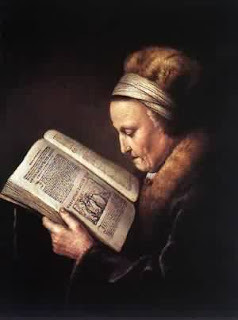 1630--Old Woman Reading a Bible,
1630--Old Woman Reading a Bible,
Gerrit Dou, Netherlands
A few women were well-educated from their early years in England, as aresult of tutors or fathers guiding their learning. They were the exception,not the rule. Most puritan women could read well enough to get through theirBibles, but that was all. In the first decades of colonial New England, schools were only for boys.
Ann Yale Hopkins, the wife of Governor Edward Hopkinsof Connecticut,was believed to have gone insane not because she inherited madness or wasdriven to it by illness, injury, fear, or unbearable hardships offirst-generation settlers, but because of her scholarship and the resulting mentalexhaustion.
Massachusetts Bay Gov. John Winthrop wrote: "Mr.Hopkins, the governor of Hartford upon Connecticut, came to Boston, and broughthis wife with him, (a godly young woman, and of special parts,) who was falleninto a sad infirmity, the loss of her understanding and reason, which had beengrowing upon her divers years, by occasion of her giving herself wholly to reading and writing, and had written manybooks. Her husband, being very loving and tender of her, was loath to grieveher [about spending too much time in reading and writing]; but he saw his error,when it was too late. For if she hadattended her household affairs, and such things as belong to women, and notgone out of her way and calling to meddle in such things as are proper for men,whose minds are stronger, etc., she had kept her wits, and might have improvedthem usefully and honorably in the place God had set her." ~John Winthrop'sJournal
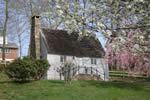 The Hopkins' houseEdward Hopkins (born 1600) and Ann Yale Hopkins (born 1615)were among the co-founders of New Haven, Connecticut in 1637, but after only two months, moved to Hartford and set up a 120-acre farm and merchant tradewith Turkey.Edward was elected governor or deputy governor for many one-year terms. Thehouse they lived in from 1640, still exists on Popieluszko Court in Hartford.
The Hopkins' houseEdward Hopkins (born 1600) and Ann Yale Hopkins (born 1615)were among the co-founders of New Haven, Connecticut in 1637, but after only two months, moved to Hartford and set up a 120-acre farm and merchant tradewith Turkey.Edward was elected governor or deputy governor for many one-year terms. Thehouse they lived in from 1640, still exists on Popieluszko Court in Hartford.
It was sometimes seen as a judgment from God that a womanwas barren. Ann had no children, which was a huge disappointment to puritans. AsWinthrop wrote,"such things as belong to women," and "the place God had set her." Coming from an education-minded family, readingand writing may have been a consolation to her, just as people in our day sometimesbury themselves in a creative pursuit or work. Ann exhibited signs of insanitybeginning at about age 32 in 1647. Because men disapproved of women exhaustingtheir brains, it is highly probable that her books and writing materials wereremoved from her at that time.
Interestingly, her husband survived an Indian assassinationattempt in 1646, the year before Ann's illness was observed. It's possible thatfear helped push Ann past the threshold of reason.
Edward and Ann returned to England permanently in 1652,perhaps because of Ann's condition. He was engaged by Parliament as a navalcommissioner, but died in 1657. Ann was cared for until her death by her Yalerelatives in north Wales.
Edward's large bequests helped fund a New Haven, Connecticutschool named in his honor. 'Hopkinsis the third oldest independent school in the country. The School has beenoperating since 1660, and has retained as its historic mission, 'the breedingup of hopeful youths...for the publique service of the country in futuretymes.' Congressmen, doctors, lawyers, Yale Presidents, and civil activists allhad their start at Hopkins and are theembodiment of Hopkins'mission," says a fundraisingsite. Another generous bequest by Edward Hopkins benefited Harvard Collegein Boston.
In the next generation, Elihu Yale, born in Bostonin 1649, was one of the major benefactors of Yale University.Elihu is entombed at Wrexham, Wales,where there's a Yale College, founded in 1950.Both the Welsh college and Connecticutuniversity are named after Elihu Yale, Ann's nephew.
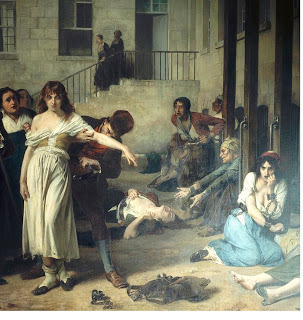 A French asylumOther New England womensuffered mental illness, which was sometimes charged as witchcraft or beingpossessed by Satan. Several women killed or attempted murder on their children,and were hanged. One woman flung her child into a pond, and when the toddlercrawled out and returned to its mother, the mother threw her child back in thewater. A witness saved the child and reported the mother, who said that shewanted to spare her child from "further misery." Yet another delusional motherwanted to save her baby from going to hell, so she killed it. The magistratesgranted latitude to people who committed lesser crimes but were known to be seriouslydisturbed, but when it came to murder, the insane were executed for that crime. There were no asylums, but family members or hired help became caretakers of the insane.
A French asylumOther New England womensuffered mental illness, which was sometimes charged as witchcraft or beingpossessed by Satan. Several women killed or attempted murder on their children,and were hanged. One woman flung her child into a pond, and when the toddlercrawled out and returned to its mother, the mother threw her child back in thewater. A witness saved the child and reported the mother, who said that shewanted to spare her child from "further misery." Yet another delusional motherwanted to save her baby from going to hell, so she killed it. The magistratesgranted latitude to people who committed lesser crimes but were known to be seriouslydisturbed, but when it came to murder, the insane were executed for that crime. There were no asylums, but family members or hired help became caretakers of the insane.
That Ann Yale Hopkins was the wife and then widow of awealthy man who was a governor probably lent to her long life in the care offamily members instead of an insane asylum. Anne lived until 1698, and died atage 83, near Wrexham, Wales.Knowing the love of learning in the Yale family, perhaps Ann was permitted toread during times of lucidity, or be read to.
We can thank our 17th-century forefathers and foremothers for their deepcommitment and personal sacrifices to improving their own minds and the mindsof their children, and setting a tradition of pursuit of first-class education.Because they knew that with education comes prosperity in virtually every aspectof human life.
The foundation ofevery state is the education of its youth. ~Diogenes Laetius

When asked how much educated men were superior to those uneducated, Aristotle answered, 'As much as the living are to the dead.' ~Diogenes Laetius
 1645--Lady Mary Fairfax,
1645--Lady Mary Fairfax, being tutored by her father, General Thomas Fairfax,
third Baron Fairfax of CameronStunning statements about education have come to light inthe last few months. One presidential candidate said that America needs "aleader, not a reader." Another said that the desire to educate more Americansis snobberyand "There are good, decent men and women … that aren't taught by someliberal college professor, trying to indoctrinate them. Oh I understand why hewants [you] to go to college. He wants to remake you in his image." A radiocommentator who flunked out of college after two semesters said that a female "authorette"with a recent BA degree and a journalism award for her first book was "over-educated."
In the 1600s, higher education was prized, and boys andyoung men were trained in science, literature, history, religion, and liberalarts. After the home-schooled Anne Hutchinson defended herself so eloquently andbested themagistrates in debates at trial in November 1637 and March 1638, Massachusetts established Harvard Collegeto train its teen boys to the ministry.
New England women guidedthe household, but remained subject to their fathers' or husbands' authority.Men believed women had the mental capacity to manage large households, manychildren and servants, and often a cottage industry like brewing beer,seamstressing, or cooking, but apparently not to be formally-educated women whodiscussed theology, as did Anne Hutchinson and later, Mary Dyer.
 1630--Old Woman Reading a Bible,
1630--Old Woman Reading a Bible,Gerrit Dou, Netherlands
A few women were well-educated from their early years in England, as aresult of tutors or fathers guiding their learning. They were the exception,not the rule. Most puritan women could read well enough to get through theirBibles, but that was all. In the first decades of colonial New England, schools were only for boys.
Ann Yale Hopkins, the wife of Governor Edward Hopkinsof Connecticut,was believed to have gone insane not because she inherited madness or wasdriven to it by illness, injury, fear, or unbearable hardships offirst-generation settlers, but because of her scholarship and the resulting mentalexhaustion.
Massachusetts Bay Gov. John Winthrop wrote: "Mr.Hopkins, the governor of Hartford upon Connecticut, came to Boston, and broughthis wife with him, (a godly young woman, and of special parts,) who was falleninto a sad infirmity, the loss of her understanding and reason, which had beengrowing upon her divers years, by occasion of her giving herself wholly to reading and writing, and had written manybooks. Her husband, being very loving and tender of her, was loath to grieveher [about spending too much time in reading and writing]; but he saw his error,when it was too late. For if she hadattended her household affairs, and such things as belong to women, and notgone out of her way and calling to meddle in such things as are proper for men,whose minds are stronger, etc., she had kept her wits, and might have improvedthem usefully and honorably in the place God had set her." ~John Winthrop'sJournal
 The Hopkins' houseEdward Hopkins (born 1600) and Ann Yale Hopkins (born 1615)were among the co-founders of New Haven, Connecticut in 1637, but after only two months, moved to Hartford and set up a 120-acre farm and merchant tradewith Turkey.Edward was elected governor or deputy governor for many one-year terms. Thehouse they lived in from 1640, still exists on Popieluszko Court in Hartford.
The Hopkins' houseEdward Hopkins (born 1600) and Ann Yale Hopkins (born 1615)were among the co-founders of New Haven, Connecticut in 1637, but after only two months, moved to Hartford and set up a 120-acre farm and merchant tradewith Turkey.Edward was elected governor or deputy governor for many one-year terms. Thehouse they lived in from 1640, still exists on Popieluszko Court in Hartford. It was sometimes seen as a judgment from God that a womanwas barren. Ann had no children, which was a huge disappointment to puritans. AsWinthrop wrote,"such things as belong to women," and "the place God had set her." Coming from an education-minded family, readingand writing may have been a consolation to her, just as people in our day sometimesbury themselves in a creative pursuit or work. Ann exhibited signs of insanitybeginning at about age 32 in 1647. Because men disapproved of women exhaustingtheir brains, it is highly probable that her books and writing materials wereremoved from her at that time.
Interestingly, her husband survived an Indian assassinationattempt in 1646, the year before Ann's illness was observed. It's possible thatfear helped push Ann past the threshold of reason.
Edward and Ann returned to England permanently in 1652,perhaps because of Ann's condition. He was engaged by Parliament as a navalcommissioner, but died in 1657. Ann was cared for until her death by her Yalerelatives in north Wales.
Edward's large bequests helped fund a New Haven, Connecticutschool named in his honor. 'Hopkinsis the third oldest independent school in the country. The School has beenoperating since 1660, and has retained as its historic mission, 'the breedingup of hopeful youths...for the publique service of the country in futuretymes.' Congressmen, doctors, lawyers, Yale Presidents, and civil activists allhad their start at Hopkins and are theembodiment of Hopkins'mission," says a fundraisingsite. Another generous bequest by Edward Hopkins benefited Harvard Collegein Boston.
In the next generation, Elihu Yale, born in Bostonin 1649, was one of the major benefactors of Yale University.Elihu is entombed at Wrexham, Wales,where there's a Yale College, founded in 1950.Both the Welsh college and Connecticutuniversity are named after Elihu Yale, Ann's nephew.
 A French asylumOther New England womensuffered mental illness, which was sometimes charged as witchcraft or beingpossessed by Satan. Several women killed or attempted murder on their children,and were hanged. One woman flung her child into a pond, and when the toddlercrawled out and returned to its mother, the mother threw her child back in thewater. A witness saved the child and reported the mother, who said that shewanted to spare her child from "further misery." Yet another delusional motherwanted to save her baby from going to hell, so she killed it. The magistratesgranted latitude to people who committed lesser crimes but were known to be seriouslydisturbed, but when it came to murder, the insane were executed for that crime. There were no asylums, but family members or hired help became caretakers of the insane.
A French asylumOther New England womensuffered mental illness, which was sometimes charged as witchcraft or beingpossessed by Satan. Several women killed or attempted murder on their children,and were hanged. One woman flung her child into a pond, and when the toddlercrawled out and returned to its mother, the mother threw her child back in thewater. A witness saved the child and reported the mother, who said that shewanted to spare her child from "further misery." Yet another delusional motherwanted to save her baby from going to hell, so she killed it. The magistratesgranted latitude to people who committed lesser crimes but were known to be seriouslydisturbed, but when it came to murder, the insane were executed for that crime. There were no asylums, but family members or hired help became caretakers of the insane. That Ann Yale Hopkins was the wife and then widow of awealthy man who was a governor probably lent to her long life in the care offamily members instead of an insane asylum. Anne lived until 1698, and died atage 83, near Wrexham, Wales.Knowing the love of learning in the Yale family, perhaps Ann was permitted toread during times of lucidity, or be read to.
We can thank our 17th-century forefathers and foremothers for their deepcommitment and personal sacrifices to improving their own minds and the mindsof their children, and setting a tradition of pursuit of first-class education.Because they knew that with education comes prosperity in virtually every aspectof human life.
The foundation ofevery state is the education of its youth. ~Diogenes Laetius
Published on March 06, 2012 20:58
February 28, 2012
And now for something completely different—the 17th century leg bomb
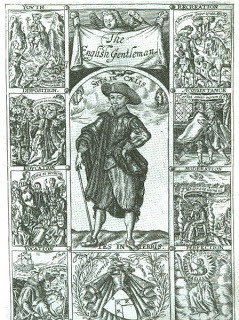 1630--men's fashion circular© Christy K. Robinson
1630--men's fashion circular© Christy K. RobinsonSince the Academy Awards presenter, Angelina Jolie, struck apose with her leg extended from the slit in her designer gown on 26 February, socialmedia are experiencing a "leg bomb." People are photoshopping Jolie's bareleg onto Whistler's Mother, Queen Elizabeth II, the Statue of Liberty, DarthVader, and many other images, and posting them to Twitter, Buzzfeed, Pinterest,and like sites. And now, I've joined the fad!

This sort of pose was very common in the 17thcentury, albeit the pictures were of men. (The pose was too provocative forfemale models, even nudes, to strike. Women did not show the inside of theirknees or thighs.) However, the male aristocrats and royalty who could afford to haveportraits made, seem to have spiked the "leg-bomb" during the 1600s. Charles IIof England(1630-1685), often "made a leg" in his portraits, but he wasn't the first.Check out the images below:
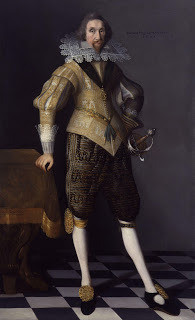 1628--James Hay (Lord Carlisle),
1628--James Hay (Lord Carlisle), made Lord Proprietor
of Barbados by King Charles I
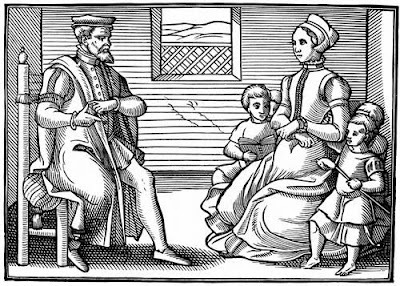 A Puritan Family, 17th-century woodcut
A Puritan Family, 17th-century woodcut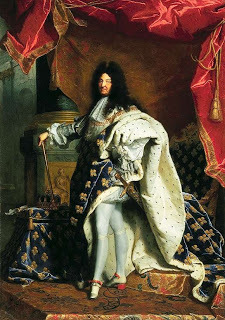 Louis XIV of France, making a leg
Louis XIV of France, making a leg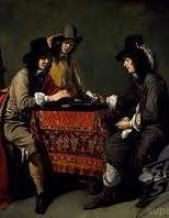 The Tric-Trac Players
The Tric-Trac Players by Mathieu Le Nain
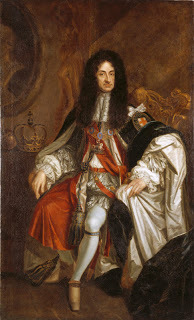 Charles II of England
Charles II of England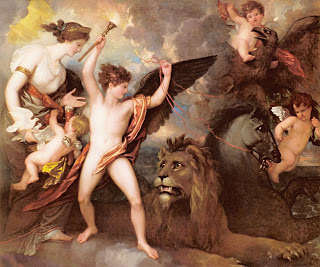 I like the look of consternation on the lion,
I like the look of consternation on the lion, hoping that the angel doesn't lose his scarf in the breeze.
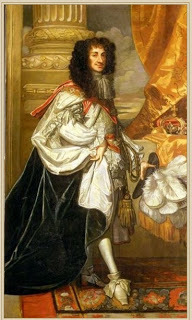 Charles II of England
Charles II of England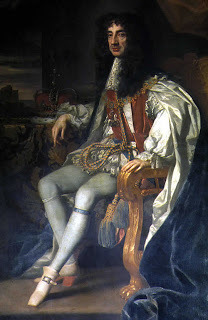 Charles II of England
Charles II of England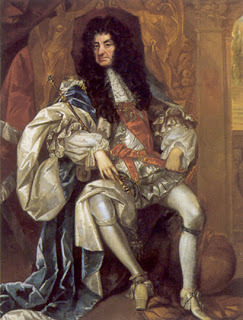 Charles II of England
Charles II of EnglandLink to the The Sun with several funny Jolie leg images: http://bit.ly/xEQjMx
Published on February 28, 2012 12:06
February 15, 2012
William Dyer, FIRST attorney general in America
Engaged for the people, by, or in the peoples' name
© Christy K. Robinson
William Dyer, who had held a succession of appointments asclerk, Secretary of State, and General Recorder, was appointed the firstAttorney General of Rhode Island in 1650. But as I discovered, Dyer was alsothe first Attorney General of any colony in North America!And wait until you read his commission. It's brilliant.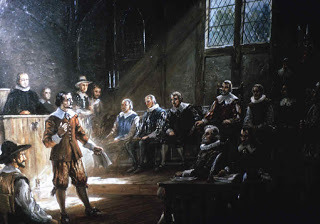
In 1628, the founders of Massachusetts Bay Colony followedthe lead of the Plymouth Colony, and obtained a royal charter to form acommunity that was self-governed but answerable to the King, Parliament, andlaws of England.The Massachusetts Bay Company purchased a huge tract of wilderness that waslater subdivided to become part of New Hampshireand Connecticut.
In late 1637, a large group of religious dissidents in the Boston area,including Anne and William Hutchinson, and William and Mary Barrett Dyer, weregiven the choice of submitting to the MassBay church-state, or being banished. Theymay have been planning to leave anyway, but the expulsion of Anne Hutchinsonfor heresy certainly hurried their departure. While she was under house arrestin the winter of 1637-38, the men were searching for and purchasing land fromthe Narragansett Indians, for what would become the Colony of ProvidencePlantations and Rhode Island.
They formed the first democracy in America (Massachusettsgovernors John Winthrop and Thomas Dudley were disdainful of democracy), and obtained theirown charter from the English government in 1643, after MassBay's Gov. Winthrop implied that Rhode Island would be annexed to Massachusetts, thusbringing the heretics back under his control.
In May 1650 the General Assembly, meeting in Newport, created theoffices of Attorney General for the Colony and Solicitor General. William Dyerand Hugh Bewitt/Buit, respectively, were immediately engaged.
Notice the wording in the order and commission for AttorneyGeneral below, that he was "Engaged forthe people, by, or in the peoples name…" Does that sound familiar, like, say, theGettysburg Address by President Abraham Lincoln in 1863, when he said that "Governmentby the people, for the people, shallnot perish from the earth"?
You won't see many "one people" or "We the People" empowering statements until 1776, in the Declaration of Independence, or 1787, when the United States Constitution was written. But Rhode Island was there in 1650, advocating for us—the People.
How wise and creative and brilliant were those Rhode Island founders?!Huzzah! This office of Attorney General was not created for the use ofoligarchs, or "the cutthroat of prosperitie" and commerce, or for preferment of the representatives and executiveofficers (feel free to contrast with modern government). It was for theinterests of the people—of any background or social structure or financialstatus.
The. Free. People.
The jobdescription promised protection from criminals, and from officers of the state. These assemblymen were not creatinglaws to cover their behinds, they were creating laws for transparency andaccountability. It's mind-boggling, contrasting what America has come to over the lastfew decades.
Records of the Colony of Rhode Island and Providence Plantations in New England, p.220 and 225:
First Attorneys-Generalof colonial/east-coast America Year instituted Colony/east coast of America First attorney general 1650 Rhode Island William Dyer 1677 North Carolina George Durant 1684 New York crown appointee 1686 Pennsylvania David Lloyd 1686 Massachusetts Benjamin Bullivant 1686 western New Jersey ?? 1688 Maryland Charles Carroll 1698 South Carolina Nicholas Trott 1704 Vermont Alexander Griffith 1712 Virginia Sir John Randolph (deputy AG) 1754 Georgia William Clifton 1778 Delaware Gunning Bedford, Jr. 1785 New Hampshire Samuel Livermore 1820 Maine Erastus Foote 1897 Connecticut Charles Phelps
 The most famous segment of Abraham Lincoln's 1863 GettysburgAddress:
The most famous segment of Abraham Lincoln's 1863 GettysburgAddress:
"government by the people, for the people."
Note the similarity to the 1650 commission to the office of Rhode Island attorney general:
"engaged for the people, by, or in the peoples' name."

© Christy K. Robinson
William Dyer, who had held a succession of appointments asclerk, Secretary of State, and General Recorder, was appointed the firstAttorney General of Rhode Island in 1650. But as I discovered, Dyer was alsothe first Attorney General of any colony in North America!And wait until you read his commission. It's brilliant.

In 1628, the founders of Massachusetts Bay Colony followedthe lead of the Plymouth Colony, and obtained a royal charter to form acommunity that was self-governed but answerable to the King, Parliament, andlaws of England.The Massachusetts Bay Company purchased a huge tract of wilderness that waslater subdivided to become part of New Hampshireand Connecticut.
In late 1637, a large group of religious dissidents in the Boston area,including Anne and William Hutchinson, and William and Mary Barrett Dyer, weregiven the choice of submitting to the MassBay church-state, or being banished. Theymay have been planning to leave anyway, but the expulsion of Anne Hutchinsonfor heresy certainly hurried their departure. While she was under house arrestin the winter of 1637-38, the men were searching for and purchasing land fromthe Narragansett Indians, for what would become the Colony of ProvidencePlantations and Rhode Island.
They formed the first democracy in America (Massachusettsgovernors John Winthrop and Thomas Dudley were disdainful of democracy), and obtained theirown charter from the English government in 1643, after MassBay's Gov. Winthrop implied that Rhode Island would be annexed to Massachusetts, thusbringing the heretics back under his control.
In May 1650 the General Assembly, meeting in Newport, created theoffices of Attorney General for the Colony and Solicitor General. William Dyerand Hugh Bewitt/Buit, respectively, were immediately engaged.
Notice the wording in the order and commission for AttorneyGeneral below, that he was "Engaged forthe people, by, or in the peoples name…" Does that sound familiar, like, say, theGettysburg Address by President Abraham Lincoln in 1863, when he said that "Governmentby the people, for the people, shallnot perish from the earth"?
You won't see many "one people" or "We the People" empowering statements until 1776, in the Declaration of Independence, or 1787, when the United States Constitution was written. But Rhode Island was there in 1650, advocating for us—the People.
How wise and creative and brilliant were those Rhode Island founders?!Huzzah! This office of Attorney General was not created for the use ofoligarchs, or "the cutthroat of prosperitie" and commerce, or for preferment of the representatives and executiveofficers (feel free to contrast with modern government). It was for theinterests of the people—of any background or social structure or financialstatus.
The. Free. People.
The jobdescription promised protection from criminals, and from officers of the state. These assemblymen were not creatinglaws to cover their behinds, they were creating laws for transparency andaccountability. It's mind-boggling, contrasting what America has come to over the lastfew decades.
Records of the Colony of Rhode Island and Providence Plantations in New England, p.220 and 225:
Acts and Orders made at the Generall Courte of Election held at Newport, May the 23d, (1650), for the Colonie of Providence Plantations.
It is ordered by this Courte,to apoynt an Atturney Generall for the Colonie, as also a Solicitor. That theAtturney Generall shall have full power to impleade any transgression of thelawe of this State in any Courte of this State; but especially to bringe allsuch matters of penal lawes to tryall of the Generall Courte of Tryalls, asalso for the tryall of the officers in the State at the Generall Assemblies,and to impleade in the full power and authoritie of the free people of thisState, their prerogatives and liberties; and because envy, the cut throat ofall prosperitie will not faile to gallop with its full careere, let the sayed Atturneybe faithfully ingaged and authorized and encouraged. Engaged for the people,by, or in the peoples name, and with their full authoritie assisted;authorized, that upon information of transgressions or transgressors of thelawes, prerogatives and liberties of the people, and their penal lawes, heshall under hand and seale take forth summons from the President or GenerallAssistants, to command any delinquent, or vehemently suspected of delinquenciein what kind soever accordinge to the premises, to appeare at the GenerallCourte, if it be thereto belonginge, or to the Generall Assemblie in thosematters proper thereunto; and if any refuse to apeare at that mandamus in theState of England's name and the free people of this State, he shall be judged guiltie;and so proceeded with according to fine or penaltie. Mr. William Dyreis deputed Generall Atturney for the Colonie, and ingaged.
First Attorneys-Generalof colonial/east-coast America Year instituted Colony/east coast of America First attorney general 1650 Rhode Island William Dyer 1677 North Carolina George Durant 1684 New York crown appointee 1686 Pennsylvania David Lloyd 1686 Massachusetts Benjamin Bullivant 1686 western New Jersey ?? 1688 Maryland Charles Carroll 1698 South Carolina Nicholas Trott 1704 Vermont Alexander Griffith 1712 Virginia Sir John Randolph (deputy AG) 1754 Georgia William Clifton 1778 Delaware Gunning Bedford, Jr. 1785 New Hampshire Samuel Livermore 1820 Maine Erastus Foote 1897 Connecticut Charles Phelps
 The most famous segment of Abraham Lincoln's 1863 GettysburgAddress:
The most famous segment of Abraham Lincoln's 1863 GettysburgAddress: "government by the people, for the people."
Note the similarity to the 1650 commission to the office of Rhode Island attorney general:
"engaged for the people, by, or in the peoples' name."
Published on February 15, 2012 20:05
February 11, 2012
Slanderers: “worser than dead flies”
© Christy K. Robinson
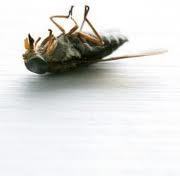 I was googling some background detail for the novel I’m writing on William and Mary Barrett Dyer, when I landed on a Wikipedia page for Rhode Island’s attorneys general. It wasn’t the page I needed, but out of affection for my 12th-generation ancestor, I stopped for a moment to read William Dyer’s worthy name—which wasn’t there! It had been replaced with a dirty word.
I was googling some background detail for the novel I’m writing on William and Mary Barrett Dyer, when I landed on a Wikipedia page for Rhode Island’s attorneys general. It wasn’t the page I needed, but out of affection for my 12th-generation ancestor, I stopped for a moment to read William Dyer’s worthy name—which wasn’t there! It had been replaced with a dirty word.Many historians and genealogists are understandably leery of Wikipedia because it can be edited by anyone with a free account. While Wikipedia has fantastic resources (I like to look up the references at the bottom of articles), mistakes are also perpetuated there. Students using Wiki as a primary source repeat the mistakes and myths in their papers. Teachers sometimes make the mistake of going there for an easy explanation to complex questions. Amateur genealogists, not knowing differently, accept those words as gospel—and there you go! Some of my author colleagues have given up trying to correct errors after having their articles or sections re-edited by passionate but clueless Wiki account holders who have read something in a novel that seems to make sense, then have changed the Wikipedia page to reflect the fiction. They get into editing wars,* especially about anything to do with Tudors or War of the Roses. This drives the historians and researchers crazy!
Facebook’s “History Police” is the community I asked to help repair a calumny—a slander!—perpetrated on the good name of William Dyer. He was the colony’s first attorney general, for two terms from May 1650 until 1652. On the Wiki page, instead of his name and city being at the top of the list of attorneys general of Rhode Island, I found this: Attorney General under the Patent of 1643William Sackmuncher, of Down Under May 1650 - 1651
What? Excuse me? (Stop laughing, or I'll poke you with the business end of my History Police sword.) If you understand urban slang, that’s a terrible thing to say about anyone. It’s slander. Some vandal with a juvenile sense of humor slandered a remarkable man who was buried in 1676. If someone had said that about William Dyer in his time, the liar would have been heavily fined for the act itself and assessed any damages incurred, and imprisoned for rebellion against an officer of the court.
Anyway, the Wikipedia page is repaired thanks to friends with Wiki coding skills, and now it hyperlinks to the William Dyer biography page. Let’s hope vandals don’t get an email notification that their graffiti has been edited.
This is the statute enacted when William Dyer was the first Secretary and General Recorder for Rhode Island, prior to his terms as Attorney General. He actually was responsible for transcribing the law (quill and ink on parchment) and filing it in a box with four locks (keys kept in the four main towns of Rhode Island), in a room to which he had a key.
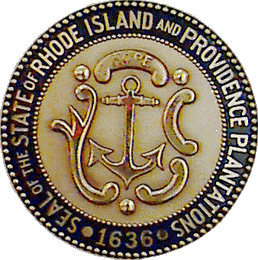
Made and agreed upon at the Generall Court of Election, held at Portsmouth, in Rhode Island, the 19, 20, 21 of May, Anno. 1647, for the Colonie and province of Providence.
Slaunder.
Published on February 11, 2012 06:00
Slanderers: "worser than dead flies"
© Christy K. Robinson
 I was googling some background detail for thenovel I'm writing on William and Mary Barrett Dyer, when I landed on aWikipedia page for Rhode Island'sattorneys general. It wasn't the page I needed, but out of affection for my 12th-generationancestor, I stopped for a moment to read William Dyer's worthy name—whichwasn't there! It had been replaced with a dirty word.
I was googling some background detail for thenovel I'm writing on William and Mary Barrett Dyer, when I landed on aWikipedia page for Rhode Island'sattorneys general. It wasn't the page I needed, but out of affection for my 12th-generationancestor, I stopped for a moment to read William Dyer's worthy name—whichwasn't there! It had been replaced with a dirty word.Many historians and genealogists are understandably leery ofWikipedia because it can be edited by anyone with a free account. WhileWikipedia has fantastic resources (I like to look up the references at thebottom of articles), mistakes are also perpetuated there. Students using Wikias a primary source repeat the mistakes and myths in their papers. Teacherssometimes make the mistake of going there for an easy explanation to complexquestions. Amateur genealogists, not knowing differently, accept those words asgospel—and there you go! Some of my author colleagues have given up trying to correcterrors after having their articles or sections re-edited by passionate butclueless Wiki account holders who have read something in a novel that seems to make sense, then have changedthe Wikipedia page to reflect the fiction. They getinto editing wars,* especially about anything to do with Tudors or War of theRoses. This drives the historians and researchers crazy!
Facebook's "History Police" is the community I asked to helprepair a calumny—a slander!—perpetrated on the good name of William Dyer. Hewas the colony's first attorney general, for two terms from May 1650 until1652. On the Wiki page,instead of his name and city being at the top of the list of attorneys generalof Rhode Island,I found this: Attorney General under the Patent of 1643William Sackmuncher, of Down Under May 1650 - 1651
What? Excuse me? (Stoplaughing, or I'll poke you with the business end of my History Police sword.) If you understand urbanslang, that's a terrible thing to say about anyone. It's slander. Some vandal with a juvenile sense of humor slandered a man who was buried in 1676. If someone had said that about William Dyer in his time, the liar have been heavily fined for the act itself and any damages incurred, and imprisoned for rebellion against an officer of the court.
Anyway, the Wikipedia page is repaired, and now ithyperlinks to the William Dyer biography page. Let's hope vandals don't get anemail notification that their graffiti has been edited.
This is the statute enacted when William Dyer was the firstGeneral Recorder for Rhode Island.He actually was responsible for transcribing the law (quill and ink onparchment) and filing it in a box with four locks (keys kept in the four main towns of Rhode Island), in a roomto which he had a key.

Made and agreed upon atthe Generall Court of Election, held at Portsmouth,in Rhode Island,the 19, 20, 21 of May, Anno. 1647, for the Colonie and province of Providence.
Slaunder.
Published on February 11, 2012 06:00
February 6, 2012
A 17th century baldness cure
17th century baldness cure is chicken dung,
says Ye Olde Men's GoodeHealth
By OLINKA KOSTER, Daily Mail UK
Article source: http://www.dailymail.co.uk/health/article-478509/17th-century-baldness-cure-chicken-dung-says-Ye-Olde-Mens-Goode-Health.html#ixzz0ycprMtmr
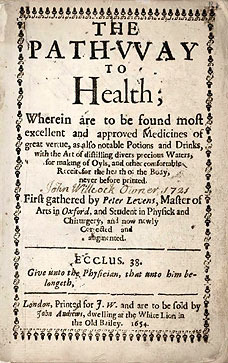 This edition says 1654, but the original
This edition says 1654, but the original edition would have been 1632.
These libraries carry the 228-page book.May 2007—In our age of gyms and jogging, dental floss anddeodorants, mouthwash and moisturisers, a chap can waft along with ease everyday feeling fit and fragrant. But back in 1654, with Oliver Cromwell ruling England,good health and grooming for men was somewhat more basic.
Then, no self-respecting male's medicine chest wasapparently complete without liberal supplies of cat's dung, snail's blood andchicken droppings - not to mention arsenic and brimstone.
Gruesome as they may sound, they were recommended asremedies for everything from bad breath to baldness, fatness to flatulence.
The fascinating array of potions and lotions is chronicledin The Path-Way To Health, a sort of 17th century version of Men's Healthmagazine, which has emerged from a private collection of antiquarian books.
One of the earliest medical journals written in English, itwill go up for auction in October [2007]. These are some of its suggestedcures:
BALDNESSAccording to the journal's author Peter Levens, the best wayto restore growth is to "Take the ashes of Culver-dung in Lye, and washthe head therewith. Also Walnut leaves beaten with Beares suet, restoreth thehaire that is plucked away. Also, the leaves and middle rinde of an Oak soddenin water, and the head washed therewith, is very good for this purpose."
For those brave enough to try the cure today, Culver-dungmay be translated as chicken dung, while "Lye" is a strong alkalinesolution of potassium salts made from ashes and used in soapmaking. Quite whereone might acquire "Beares suet" today is open to question.
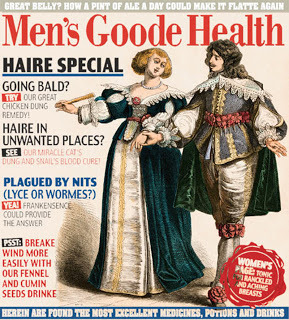 The Daily Mailillustration of what
The Daily Mailillustration of whatPathway to Health might look like in 2007
HAIR REMOVAL
To "take away haire" in unwanted places:"Take the shels of two Egges, beat them small, and stil them with a goodfire, and with that water annoynt the place; or else take hard Cats dung, dryit and beat it to powder, and temper it with strong Vineger, then wash theplace with the same, where you would have no haire to grow."Another cure for unwanted hair - which the author admits issomething of an experiment - reads: "Take the bloud of a Snaile without ashel, and it hindereth greatly the growing up of haire."Also take Labdanum (a sticky brown resin obtained fromcertain shrubs), the gum of a Ivie tree, Emmets Eggs, Arsenick and Vineger; andbinde it to the place where you wil have no haire to grow."One cure involves boiling "Frankensence and Barrowsgrease" into an ointment, while a remedy for nits suggests smearing thescalp with "the gall of a Calfe"."Take Wheat flower, and mingle the same with Honey, andlay it to the nails, and it wil help them."Where nails have been "rent from the flesh", amixture of "brimstone, arsnick and vinegar" can ease pain.
BAD BREATHThere are numerous suggestions for curing "stinkingbreath". One involves washing the mouth out with water and vinegar,followed by a concoction of aniseed, mint and cloves "sodden inwine".
BODY ODOURFor a "stench" under the armpits: "First,pluck away the haires of the arme holes, and wash them with white Wine androsewater that cassialigna has been sodden in, and use it three or fourtimes."
FLATULENCETo help "break wind in the belly," drink a mixtureof cumin seeds, fennel seeds and aniseeds in wine three times a day.
AND FOR THE LADIES...The journal includes some advice for women with "greatbellies", but makes no mention of whether it will also work onbeer-bellied men. However, like many of the cures, it appears fattening.
"Take an handful of Isop, ahandful of Herb-grace, a handful of Arsmart, and seeth all these herbs in aquart of Ale til it come to a pint, then preserve the same in a glass, and givethe woman so grived a quarter of a pint at once, first in the morning and lastat night."For "Womens paps (breasts)that arte rancled and be ful of ache," the author suggests: "TakeGrounsel, and two times as much of Brouswort, and wash them both, and stampthem, and temper them with stale Ale, and straine it through a cloth, and giveit to the Patient thereof first thing in the morning and last at night."
The journal's cover bills it as revolutionary, with asubtitle reading: "Wherein are to be found most excellent and approvedMedicines of great vertue, as also notable Potions and Drinks, with the Art ofdistilling divers precious Waters, for making of Oyls, and other comfortableReceit for the health of the body, never before printed."
The book also bears the name John Willcock, who owned the rarecopy in 1721 and made notes in its margins. It will go on sale at auctioneersBonhams in Oxfordin October [2007] and is listed to fetch a modest £400.
Book specialist Luke Batterham said: "It is afascinating volume - on the cusp of being an enlightened work and a quack book.It is a genuine attempt at a medicinal guide, accumulating worthwhile remediesfrom established sources with old wives' tales."
Published on February 06, 2012 15:15
January 23, 2012
Those heathenish liquors, chocolate and coffee
© Christy K. Robinson
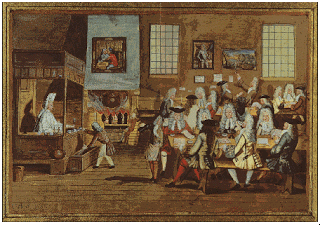 A London coffee house in the 1660s. The coffee warms
A London coffee house in the 1660s. The coffee warmsby the fireplace. The only woman is the barkeeper
(or should I say "barista"). She charged a penny per
entrant, coffee or chocolate extra. The coffee house
became a post office, news and gossip joint, and
a place for social, political, and educational comment.
Three beverages that we consider indispensable to ouremotional well-being burst upon the English scene within a few years of eachother, during the lifetimes of William and Mary Dyer. Surely these expensive and decadent drinks had no effect upon the Dyers' lives, as they hadlarger issues to deal with. However, it's possible that their second-eldestson, Major William Dyer, would have had dealings with coffee and chocolate importswhen he was customs inspector for the Crown in New York, which was first a Dutch colony.The Dutch East India Company was the primary mover of tea, coffee, andchocolate. I also found images of a chocolate pot owned by the great-grandsonof William and Anne Hutchinson, so stay with me.
Yes, that's really stretching for this blog—but I can, so Iwill! Make a cup of your favorite hot drink, put your feet up, and enjoythis sometimes-humorous essay.
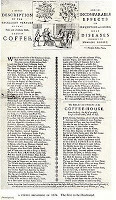 Rules for Coffeehouses
Rules for Coffeehouses Click to enlarge COFFEE
The discovery of coffee beans as the base of a stimulantdrink probably originated in east Africa, or southern Arabia.Coffee plants were cultivated by the 15th century, for use by coffeelovers in several Arabic countries, including Persia,Turkey, Ethiopia, and Syria. The joy of coffee's stimulantproperties spread quickly, despite the occasional fatwa, prohibition, orpersecution by disapproving Muslim and Christian clergy. Link to NPR article on coffee: http://www.npr.org/blogs/thesalt/2012/01/10/144988133/drink-coffee-off-with-your-head
After a 1650 debut in Oxford,coffee houses opened in Londonin 1652. In a short time, 300 of them operated there. Thousands sprang up around the country. After King Charles II's restoration to the throne of England in 1660, many sectors of society,notably the puritans who had controlled Britain in the 1640s and 1650s, exchangednews and fomented plots to bring down King Charles, a not-so-secret Catholicwho kept multiple mistresses, to the intense dismay of the puritan, Presbyterian, and even the Anglican reformers. Charles tried to suppress the proliferation of coffeehouses, saying they were "places where the disaffected met, and spreadscandalous reports concerning the conduct of His Majesty and his Ministers."
In1675, a paternal Government issued a proclamation for shutting up andsuppressing all coffeehouses. They found, however, that in making thisproclamation they had gone a step too far. So early as this period thecoffee-house had become a power in the land—as Macaulay tells us—a mostimportant political institution, when public meetings, harangues, resolutions,and the rest of the machinery of agitation, had not come into fashion, andnothing like a newspaper existed. In such circumstances the coffee-houses werethe chief organs through which the public opinion of the metropolis venteditself. Consequently, on a petition of the merchants, and retailers of coffee,permission was granted to keep the coffee-houses open for six months, under anadmonition that the masters of them should prevent all scandalous papers,books, and libels from being read in them, and hinder every person fromdeclaring, uttering, or divulging all manner of false and scandalous reportsagainst Government or the ministers thereof. The absurdity of constitutingevery maker of a cup of coffee a censor of the press was too great even forthose days: the proclamation was laughed at, and no more was heard of thesuppression of coffee-houses. Source:Old and New London, by GeorgeWalter Thornbury and Edward Walford, p. 533.
Coffee klatches in the 17th-century were composedof men of certain professions and social classes. Clergy, scientists, artistsand musicians, philosophers, stockbrokers, and physicians met to share news,opinions, and discoveries or advances in their professions. In later years,some of the coffee houses which had been exclusive to subscribed members becamegentlemen's clubs.
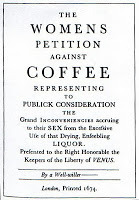 Women were banned from coffee houses, and soon began toresent their husbands spending so much time away from home. A satirical,pun-filled pamphlet circulated, called The WomensPetition Against Coffee, which was
almost certainly written by men—I'dguess at a table in a coffee house!
Key phrases were: Coffee leads men to trifle away their time, scald their chops, and spend their money, all for a little base, black, thick, nasty, bitter, stinking nauseous puddle water.We can Attribute to nothing more than the Excessive use of that Newfangled, Abominable, Heathenish Liquor called COFFEE, which Riffling Nature of her Choicest Treasures, and Drying up the Radical Moisture, has so Eunucht our Husbands, and Crippled our more kind Gallants, that they are become as Impotent, as Age… A Betrothed Queen might trust her self a bed with one of them, without the nice Caution of a sword between them: nor can call all the Art we use revive them from this Lethargy, so unfit they are for Action, that like young Train-band-men when called upon Duty, their Ammunition is wanting; peradventure they Present, but cannot give Fire, or at least do but flash in the Pan, instead of doing executions. The first coffee house in America was not a SeattleStarbucks. It was in Boston,in October of 1676, run by John Sparry. Coffee caught on well, but China tea wasthe preferred beverage for the next century, leading up to the famousrevolutionary event after which a certain 21st-century politicalmovement is named. (But they're not getting any ink from this blog!)
Women were banned from coffee houses, and soon began toresent their husbands spending so much time away from home. A satirical,pun-filled pamphlet circulated, called The WomensPetition Against Coffee, which was
almost certainly written by men—I'dguess at a table in a coffee house!
Key phrases were: Coffee leads men to trifle away their time, scald their chops, and spend their money, all for a little base, black, thick, nasty, bitter, stinking nauseous puddle water.We can Attribute to nothing more than the Excessive use of that Newfangled, Abominable, Heathenish Liquor called COFFEE, which Riffling Nature of her Choicest Treasures, and Drying up the Radical Moisture, has so Eunucht our Husbands, and Crippled our more kind Gallants, that they are become as Impotent, as Age… A Betrothed Queen might trust her self a bed with one of them, without the nice Caution of a sword between them: nor can call all the Art we use revive them from this Lethargy, so unfit they are for Action, that like young Train-band-men when called upon Duty, their Ammunition is wanting; peradventure they Present, but cannot give Fire, or at least do but flash in the Pan, instead of doing executions. The first coffee house in America was not a SeattleStarbucks. It was in Boston,in October of 1676, run by John Sparry. Coffee caught on well, but China tea wasthe preferred beverage for the next century, leading up to the famousrevolutionary event after which a certain 21st-century politicalmovement is named. (But they're not getting any ink from this blog!) CHOCOLATE
Cocoa beans, from which chocolate is derived, were used ascurrency from at least 1200 AD, though the bitter drink was cherished as bothmedication and royal treat since at least 300 AD by the Mayans and later the Aztecsof Central America. In the early 16th century, the cocoa drink wasmixed with vanilla, sugar, and spice, and became a favorite of Spanish nobility.
 Cocoa beans in their pod. SO not sheep-dung-like!For those of a sensitive nature or chocolate addicts, pleaseforgive the graphic nature of this paragraph. In 1579 and 1587, Englishbuccaneers, as part of the naval war against Spain, burned cargoes of cocoa, andnot by roasting the beans. After taking over Spanish ships loaded with Mexican cocoabeans headed for Spain,English buccaneers put the cargo to the torch, thinking the beans were sheepdung. I know!!! Who cannot tell thedifference between sheep dung and seed pods? Source: http://www.chocolatemonthclub.com/chocolatehistory.htm
Cocoa beans in their pod. SO not sheep-dung-like!For those of a sensitive nature or chocolate addicts, pleaseforgive the graphic nature of this paragraph. In 1579 and 1587, Englishbuccaneers, as part of the naval war against Spain, burned cargoes of cocoa, andnot by roasting the beans. After taking over Spanish ships loaded with Mexican cocoabeans headed for Spain,English buccaneers put the cargo to the torch, thinking the beans were sheepdung. I know!!! Who cannot tell thedifference between sheep dung and seed pods? Source: http://www.chocolatemonthclub.com/chocolatehistory.htm The joys of chocolate consumption went through France's noble and royal classes, and then somebrilliant but anonymous Frenchman opened a shop in London in 1657. 'In Bishopsgate Street, in Queen's HeadAlley, at a Frenchman's house, is an excellent West Indian drink calledChocolate to be sold, where you may have it ready at any time and also unmadeat reasonable rates.' It wasn't until the 19th century that cocoabutter was extracted for candy-making, so London's cocoa drink of the 17thcentury would have been very rich with butterfat—and been enriched by eggs,spices, or sack (sweet wine), with a thick melted-ice-cream consistency.
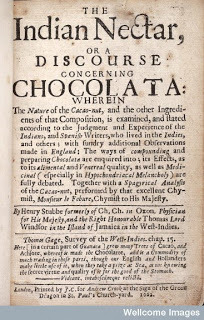
Apparently, chocolate drink was considered a hangoverremedy. In April 1664, socialite Samuel Pepys wrote in his famous journal:"Waked in the morning with my head in a sad taking through the last night'sdrink, which I am very sorry for; so rose and went out with Mr. Creed to drinkour morning draft, which he did give me in chocolate to settle my stomach."
In 1670, Dorothy Jones and Jane Barnard sold chocolate in Boston. By 1682, Jamaica exported cocoa to Boston, which probably marks the beginning ofchocolate production in the American colonies. In 1705, cocoa and chocolatewere advertised for sale in Boston at Mr. JamesLeblond's warehouse on the Long Wharf. Source: http://www.history.org/history/teaching/enewsletter/volume9/jan11/featurearticle.cfm
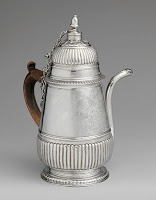 Chocolate pot is engraved
Chocolate pot is engraved with the arms of Hutchinson,
probably for Thomas Hutchinson
(1674/75–1739), a Boston merchant
and member ofthe Massachusettslegislature.
Thomas was grandson of Edward Hutchinson,
and great-grandson of
William and Anne (Marbury) Hutchinson.
Source: http://www.metmuseum.org/toah/works-of-art/33.120.221Judge Samuel Sewall of Massachusetts,best known for his participation in the Salemwitch trials, wrote about breakfasting on "Venison and Chockalatte" in 1697with Lt. Gov. William Stoughton. Sewall wrote in his journal, "Massachusetts and Mexico met at his Honour's Table."Sewell must have been quite a connoisseur of chocolate, because ten yearsearlier, he had bought "21 balls of chokolatto," and over the years, he gavegenerous gifts of it on special occasions.
So, have you finished that exotic stimulant beverage yet? Iprepare my cocoa from a mix, with low-fat milk boiled to froth in themicrowave, and my coffee is from chocolate-flavored beans. I'm sure there's nocomparison to a full-butter cocoa slowly warmed at a hearth, with vanilla or chili spice added to it.
If you're curious about the taste of colonial Americanchocolate, I've read that thiscompany sells an authentic-tasting product.
Published on January 23, 2012 21:37
January 14, 2012
They delight to be persecuted
© Christy K. Robinson
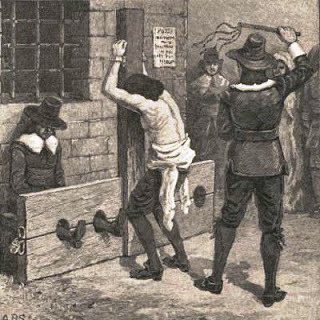 "Blessed are theywhich are persecuted for
"Blessed are theywhich are persecuted for
righteousness' sake: for theirs is the kingdom ofheaven. Blessed are ye,when men shall revile you,
and persecute you, and shall say
all manner of evilagainst you falsely, for my sake."
~Jesus Christ, the Beattitudes
If the Quaker missionaries of the 1650s were so harshly and frequentlypersecuted in New England, Maryland,and Virginia, but had refuge in Rhode Island, why did they not stay safe and secure in Rhode Island?
Theyweren't particularly desired in Rhode Island, and Roger Williams and the Baptist leadershipsometimes called their doctrines pernicious, dangerous, and damaging. Rhode Island,as codified in their charters, believed strongly in the separation of civil andecclesiastical powers—or what we'd call separation of church and state. Thishad come from Rev. Roger Williams, Dr. John Clarke, and the large group ofMassachusetts Bay pioneers who were banished from Boston in 1638, including Anne and WilliamHutchinson and William and Mary Dyer.
Massachusetts Bay colonyhad been founded on the dream that it would be a sanctuary and beacon of lightin the darkness of corrupt European religion. It would be the pure New Jerusalem, they hoped,a fulfillment of Bible prophecy. The ministers and magistrates ruled the GeneralCourt, basing their laws on the Bible's Old Testament. And they were the ones who received and interpreted revelation from theBible, not cursed, weak-minded women like Anne Hutchinson and Mary Dyer.
Not quite 20 years had passed since the big AntinomianControversy when the Friends, called Quakers in a derogatory way because oftheir shaking with passion or ecstasy when in communion with the Holy Spirit,entered New England with the intent of sharingtheir beliefs and gaining adherents. In 1655-1657, more and more English Quakersshowed up in Massachusetts and Connecticut, where theywere not the peace-loving, contemplative, silent types that we think of: theydisrupted church services, preached concepts heretical to the puritans, refusedto pay their taxes/tithes, and even, in a few cases, bared their breasts toshow their innocence before God. (This may have been a contributing factor tostripping men and women to the waistfor public whippings. It gave them scars which proved they were guilty criminals.)
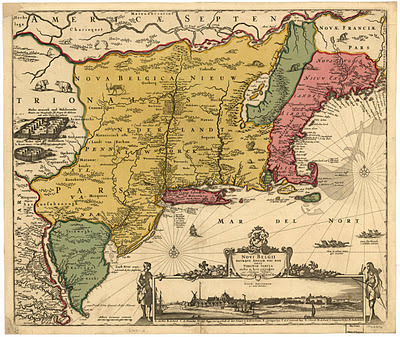 1685—Dutch map of New England (click to enlarge)The United Colonies of New Haven, Connecticut, Plymouth,and Massachusetts Bay (but mostly the Bay leaders in Boston)wrote a letter in September 1657 to Rhode Island's assembly, urging them to treat the Quakersin a way consistent with the other colonies, and to not grant refuge to theQuakers. (At this time, Mary Dyer had experienced her first imprisonment in Boston, and had been rescued and brought home to Newport by her husband, a well-known Rhode Island attorney general and admiral ofthe United Colonies.)
1685—Dutch map of New England (click to enlarge)The United Colonies of New Haven, Connecticut, Plymouth,and Massachusetts Bay (but mostly the Bay leaders in Boston)wrote a letter in September 1657 to Rhode Island's assembly, urging them to treat the Quakersin a way consistent with the other colonies, and to not grant refuge to theQuakers. (At this time, Mary Dyer had experienced her first imprisonment in Boston, and had been rescued and brought home to Newport by her husband, a well-known Rhode Island attorney general and admiral ofthe United Colonies.)
GENTLEMEN,—Wesuppose you have understood that the last year a company of Quakers arrived atBoston, upon no other account than to disperse their pernicious opinions, hadthey not been prevented by the prudent care of the government, who by that experiencethey had of them, being sensible of the danger that might befall the Christianreligion here professed, by suffering such to be received or continued in thecountry, presented the same unto the Commissioners at their meeting atPlymouth; who, upon that occasion, commended it to the general courts of theUnited Colonies, that all Quakers,Ranters, and such notorious heretics, might be prohibited coming among us; andthat if such should arise from among ourselves, speedy care might be taken toremove them; (and as we are informed) the several jurisdictions have madeprovision accordingly; but it is by experience found that means will fallshort without further care by reason of your admission and receiving of such,from where they may have opportunity to creep in among us, or means to infuseand spread their accursed tenets to the great trouble of the colonies, if notto the professed in them; notwithstanding any care that has been previouslytaken to prevent the same; whereof we cannot but be very sensible and think no care too great to preserve us from sucha pest, the contagion whereof (if received) within your colony, weredangerous to be diffused to the others by means of the intercourse, especially to the places of trade among us;which we desire may be with safety continued between us [threat to disrupttrade and passage through their lands]; we therefore make it our request,that you as the rest of the colonies, take such order herein that yourneighbors may be freed from that danger. That you remove these Quakers that have been received, and for the futureprohibit their coming among you; whereunto the rule of charity toyourselves and us (we conceive), doth oblige you; wherein if you should we hopeyou will not be wanting; yet we could not but signify this our desire; andfurther declare, that we apprehend thatit will be our duty seriously to consider, what provision God may call us tomake to prevent the aforesaid mischief [another threat]; and for our furtherguidance and direction herein, we desire you to impart your mind and resolutionto the General Court of Massachusetts, which assembles the 14th of Octobernext. We have not further to trouble you at present, but to assure you wedesire to continue your loving friends and neighbors, the Commissioners of theUnited Colonies."
The Rhode Island General Assembly answered the lettershortly thereafter, claiming that separation of religious and civil powers waseven more important to them than getting rid of those "pernicious" Quakers.
Sir,this is our earnest and present request unto you in this matter, as you mayperceive in our answer to the United Colonies, that we fly, as to our refuge inall civil respects, to his highness and honorable council, as not being subject to any others in matters of our civil state;so may it please you to have an eye and ear open, in case our adversariesshould seek to undermine us in our privileges granted unto us, and to plead ourcase in such sort as we may not becompelled to exercise any civil power over men's consciences, so long ashuman orders, in point of civility, are not corrupted and violated, which ourneighbors about us do frequently practice, whereof many of us have largeexperience, and do judge it to be no less than a point of absolute cruelty. [In other words, "We know firsthand of your cruelty."]
And further, the Rhode Island Assembly poked Massachusetts Gov. John Endecott in the belly by sayingthat the Quakers had too much peace and prosperity in Rhode Island, and couldn't get convertsto their faith by speechifying—only by being persecuted, which is why thoseQuakers kept going back to puritan jurisdictions and inviting trouble! Rhode Islandclearly implied that if the puritans would just leave the Quakers alone, therewould be no trouble at all.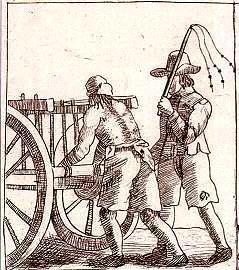 Massachusetts Bay Colony would strip
Massachusetts Bay Colony would strip
Quaker men and women to the waist,
and tie them to a wagon, whipping them
ten lashes in three different towns
before expelling them. If it was winter,
it made no difference to them.
Muchhonored gentlemen. …Andas concerning these Quakers (so called) which are now among us, we have no lawamong us whereby to punish any for only declaring by words, &c. their mindsand understandings concerning the things and ways of God… And we find that in those places where thesepeople … are most suffered to declare themselves freely, and are only opposedby arguments in discourse, there they least of all desire to come, and weare informed that they begin to loaththis place, for that they are not opposed by the civil authority… they delightto be persecuted by civil powers, and when they are so, they are like togain more adherents by the conceit of their patient sufferings, than by consentto their pernicious sayings.
Simply put, the persecution of Quakers was driving interest in their faith and their ability to patiently endure suffering. Practically every puritan and Quaker knew their Bibles well enough to see a fulfillment of Revelation 3:9-11. "And watch as I take those who call themselves truebelievers but are nothing of the kind, pretenders whose true membership is inthe club of Satan—watch as I strip off their pretensions and they're forced toacknowledge it's you that I've loved. Becauseyou kept my Word in passionate patience, I'll keep you safe in the time oftesting that will be here soon, and all over the earth, every man, woman, andchild put to the test. I'm on my way; I'll be there soon. Keep a tight grip onwhat you have so no one distracts you and steals your crown."
Of course, it was never as simple as I've made out here.Religion was not a lifestyle choice, or even a temporal, bodily life and death matter in the 17thcentury. It was a matter of a soul's eternal life versus perishing in the firesof hell.
Still, I admire the way the Rhode Islanders stood strong onthe principle of liberty of conscience, and even if some of them disapproved ofQuakers or Jews or Baptists, it was more important both to their personal honor and to their immortal souls, to uphold freedom for all,than to cave in to the threat of trade or travel restrictions, or bowing to thewishes of intolerant religionists.
 "Blessed are theywhich are persecuted for
"Blessed are theywhich are persecuted for righteousness' sake: for theirs is the kingdom ofheaven. Blessed are ye,when men shall revile you,
and persecute you, and shall say
all manner of evilagainst you falsely, for my sake."
~Jesus Christ, the Beattitudes
If the Quaker missionaries of the 1650s were so harshly and frequentlypersecuted in New England, Maryland,and Virginia, but had refuge in Rhode Island, why did they not stay safe and secure in Rhode Island?
Theyweren't particularly desired in Rhode Island, and Roger Williams and the Baptist leadershipsometimes called their doctrines pernicious, dangerous, and damaging. Rhode Island,as codified in their charters, believed strongly in the separation of civil andecclesiastical powers—or what we'd call separation of church and state. Thishad come from Rev. Roger Williams, Dr. John Clarke, and the large group ofMassachusetts Bay pioneers who were banished from Boston in 1638, including Anne and WilliamHutchinson and William and Mary Dyer.
Massachusetts Bay colonyhad been founded on the dream that it would be a sanctuary and beacon of lightin the darkness of corrupt European religion. It would be the pure New Jerusalem, they hoped,a fulfillment of Bible prophecy. The ministers and magistrates ruled the GeneralCourt, basing their laws on the Bible's Old Testament. And they were the ones who received and interpreted revelation from theBible, not cursed, weak-minded women like Anne Hutchinson and Mary Dyer.
Not quite 20 years had passed since the big AntinomianControversy when the Friends, called Quakers in a derogatory way because oftheir shaking with passion or ecstasy when in communion with the Holy Spirit,entered New England with the intent of sharingtheir beliefs and gaining adherents. In 1655-1657, more and more English Quakersshowed up in Massachusetts and Connecticut, where theywere not the peace-loving, contemplative, silent types that we think of: theydisrupted church services, preached concepts heretical to the puritans, refusedto pay their taxes/tithes, and even, in a few cases, bared their breasts toshow their innocence before God. (This may have been a contributing factor tostripping men and women to the waistfor public whippings. It gave them scars which proved they were guilty criminals.)
 1685—Dutch map of New England (click to enlarge)The United Colonies of New Haven, Connecticut, Plymouth,and Massachusetts Bay (but mostly the Bay leaders in Boston)wrote a letter in September 1657 to Rhode Island's assembly, urging them to treat the Quakersin a way consistent with the other colonies, and to not grant refuge to theQuakers. (At this time, Mary Dyer had experienced her first imprisonment in Boston, and had been rescued and brought home to Newport by her husband, a well-known Rhode Island attorney general and admiral ofthe United Colonies.)
1685—Dutch map of New England (click to enlarge)The United Colonies of New Haven, Connecticut, Plymouth,and Massachusetts Bay (but mostly the Bay leaders in Boston)wrote a letter in September 1657 to Rhode Island's assembly, urging them to treat the Quakersin a way consistent with the other colonies, and to not grant refuge to theQuakers. (At this time, Mary Dyer had experienced her first imprisonment in Boston, and had been rescued and brought home to Newport by her husband, a well-known Rhode Island attorney general and admiral ofthe United Colonies.)GENTLEMEN,—Wesuppose you have understood that the last year a company of Quakers arrived atBoston, upon no other account than to disperse their pernicious opinions, hadthey not been prevented by the prudent care of the government, who by that experiencethey had of them, being sensible of the danger that might befall the Christianreligion here professed, by suffering such to be received or continued in thecountry, presented the same unto the Commissioners at their meeting atPlymouth; who, upon that occasion, commended it to the general courts of theUnited Colonies, that all Quakers,Ranters, and such notorious heretics, might be prohibited coming among us; andthat if such should arise from among ourselves, speedy care might be taken toremove them; (and as we are informed) the several jurisdictions have madeprovision accordingly; but it is by experience found that means will fallshort without further care by reason of your admission and receiving of such,from where they may have opportunity to creep in among us, or means to infuseand spread their accursed tenets to the great trouble of the colonies, if notto the professed in them; notwithstanding any care that has been previouslytaken to prevent the same; whereof we cannot but be very sensible and think no care too great to preserve us from sucha pest, the contagion whereof (if received) within your colony, weredangerous to be diffused to the others by means of the intercourse, especially to the places of trade among us;which we desire may be with safety continued between us [threat to disrupttrade and passage through their lands]; we therefore make it our request,that you as the rest of the colonies, take such order herein that yourneighbors may be freed from that danger. That you remove these Quakers that have been received, and for the futureprohibit their coming among you; whereunto the rule of charity toyourselves and us (we conceive), doth oblige you; wherein if you should we hopeyou will not be wanting; yet we could not but signify this our desire; andfurther declare, that we apprehend thatit will be our duty seriously to consider, what provision God may call us tomake to prevent the aforesaid mischief [another threat]; and for our furtherguidance and direction herein, we desire you to impart your mind and resolutionto the General Court of Massachusetts, which assembles the 14th of Octobernext. We have not further to trouble you at present, but to assure you wedesire to continue your loving friends and neighbors, the Commissioners of theUnited Colonies."
The Rhode Island General Assembly answered the lettershortly thereafter, claiming that separation of religious and civil powers waseven more important to them than getting rid of those "pernicious" Quakers.
Sir,this is our earnest and present request unto you in this matter, as you mayperceive in our answer to the United Colonies, that we fly, as to our refuge inall civil respects, to his highness and honorable council, as not being subject to any others in matters of our civil state;so may it please you to have an eye and ear open, in case our adversariesshould seek to undermine us in our privileges granted unto us, and to plead ourcase in such sort as we may not becompelled to exercise any civil power over men's consciences, so long ashuman orders, in point of civility, are not corrupted and violated, which ourneighbors about us do frequently practice, whereof many of us have largeexperience, and do judge it to be no less than a point of absolute cruelty. [In other words, "We know firsthand of your cruelty."]
And further, the Rhode Island Assembly poked Massachusetts Gov. John Endecott in the belly by sayingthat the Quakers had too much peace and prosperity in Rhode Island, and couldn't get convertsto their faith by speechifying—only by being persecuted, which is why thoseQuakers kept going back to puritan jurisdictions and inviting trouble! Rhode Islandclearly implied that if the puritans would just leave the Quakers alone, therewould be no trouble at all.
 Massachusetts Bay Colony would strip
Massachusetts Bay Colony would strip Quaker men and women to the waist,
and tie them to a wagon, whipping them
ten lashes in three different towns
before expelling them. If it was winter,
it made no difference to them.
Muchhonored gentlemen. …Andas concerning these Quakers (so called) which are now among us, we have no lawamong us whereby to punish any for only declaring by words, &c. their mindsand understandings concerning the things and ways of God… And we find that in those places where thesepeople … are most suffered to declare themselves freely, and are only opposedby arguments in discourse, there they least of all desire to come, and weare informed that they begin to loaththis place, for that they are not opposed by the civil authority… they delightto be persecuted by civil powers, and when they are so, they are like togain more adherents by the conceit of their patient sufferings, than by consentto their pernicious sayings.
Simply put, the persecution of Quakers was driving interest in their faith and their ability to patiently endure suffering. Practically every puritan and Quaker knew their Bibles well enough to see a fulfillment of Revelation 3:9-11. "And watch as I take those who call themselves truebelievers but are nothing of the kind, pretenders whose true membership is inthe club of Satan—watch as I strip off their pretensions and they're forced toacknowledge it's you that I've loved. Becauseyou kept my Word in passionate patience, I'll keep you safe in the time oftesting that will be here soon, and all over the earth, every man, woman, andchild put to the test. I'm on my way; I'll be there soon. Keep a tight grip onwhat you have so no one distracts you and steals your crown."
Of course, it was never as simple as I've made out here.Religion was not a lifestyle choice, or even a temporal, bodily life and death matter in the 17thcentury. It was a matter of a soul's eternal life versus perishing in the firesof hell.
Still, I admire the way the Rhode Islanders stood strong onthe principle of liberty of conscience, and even if some of them disapproved ofQuakers or Jews or Baptists, it was more important both to their personal honor and to their immortal souls, to uphold freedom for all,than to cave in to the threat of trade or travel restrictions, or bowing to thewishes of intolerant religionists.
Published on January 14, 2012 14:20
January 2, 2012
The birth of a nation, the old-fashioned way
© Christy K. Robinson
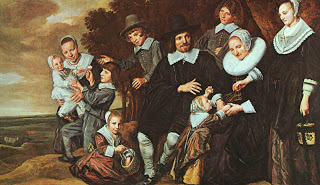 Family in a Landscape, ca. 1630-35,
Family in a Landscape, ca. 1630-35, National Gallery, LondonTwo centuries of under-population in England after the Black Death in1348-51 were followed by the Little Ice Age which brought crop failure, famine,and waves of deadly epidemics. Then there were wars, foreign and domestic, thatkilled countless thousands of men in battle, not counting the women andchildren and old people left at home to starve, die of disease and accident,and become refugees when they were dispossessed or burned out of theirfarms. The religious reformations withCatholic versus Protestant, Protestant versus new sects, all Christians versussuspected witches, Catholic versus Jews and Muslims—all brought economic andenvironmental disaster, fear, war, torture, and executions to millions and putthem on the run, primarily to the Americas. Too often the religious wars were "cleansing"genocides as the world witnessed in Yugoslavia in the 1990s.
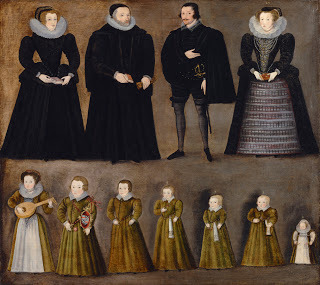 The Bartholomew family ca. 1605.
The Bartholomew family ca. 1605. Two of the five boys emigrated to Massachusetts as adults.Suddenly, there was a baby boom! In the last quarter of the16th century, when William Dyer's and Mary Barrett's parents and the leaders ofMassachusetts Colony were born in England, the population grew bymore than 50 percent. More children were born than adults died. The averagelife expectancy of that quarter-century was only about 41 years of age, thoughthe average sank to 35 in the 1660s (when Mary was executed at about age 49);and 31 years in the 1670s, when William died of unknown cause at age 67. Even with Mary's execution, they both beatthe averages! So did the Hutchinsons, John Winthrop, Thomas Dudley, JohnCotton, Roger Williams, and many others. http://publishing.cdlib.org/ucpressebooks/view?docId=ft096n99tf&brand=ucpress
Then all the babies from the boom of the late 16thcentury started having children—the strong-willed, strong-backed generationthat would fulfill the dream of multiplying the faithful for the "New Earth."
In Mary's adult years, New England grew from less than 4,600in 1630, to 26,600 in 1640 during the Great Migration, and then to 50,000 in1650. England must haveseemed to be emptying out in 1636, the peak of migration, when 21,000 peoplesailed into Boston.(Many thousands more poured into Virginiaat that time.)
However, the numbers are only estimates, and highly variablebetween reports. Historian and author David Cressy, in Coming Over, wrote, "The white population of New England in 1630has been estimated at 1,800, encompassing the Plymouthsettlers, the Massachusetts Bay people at Salemand Boston, andother stragglers and interlopers farther north. By 1640 the population hadgrown to 13,500. What, then, had happened to the participants in the greatmigration? If 21,000 people came over in the 1630s but only two-thirds of thatnumber could be found at the end of the decade we must assume that some of theremainder died and the rest moved on or went home."
Population growth in the 1640s decade in New England was allabout procreation, as few people emigrated from England during their Civil Wars,and some settlers seem to have sailed back to what they thought would bePuritan rule, but turned out to be a bloody war. Colonial Americans, those whostayed, often had large families. Getting married and having children, andraising them to be members of the spiritual community were strong beliefs ofthe puritan society. William and Anne Hutchinson, friends and mentors of theDyers who were their parents' age, had 16 children starting in 1613. Mary andWilliam Dyer had six children that lived to be adults. Reverend John Cotton andhis second wife raised seven. Governor John Winthrop, though his successivefour wives, fathered 16, though most of them did not survive infancy orchildhood.
HerodiasLong was the mother of 10 children. As her biographical-fiction-writerdescendant, Jo Ann Butler said, "Herodias started bearing children far earlierthan most of her contemporaries. She had her first child when she was about 14.Interestingly, her last child was born when Herod was only about 34 years old.Was it illness that ended Herod's fertility, or some other factor? She may havebeen grateful - if she had continued bearing children until menopause, Herodcould well have borne 20 children! Another of my ancestors had 22, but she wasmost efficient - she had three sets of twins."
The early New Englandsettlers built their society in spite of epidemic diseases, barbaric medicaland surgical practices, starvation and famine, accident and injury, wars withthe native Americans, and reverse migration.
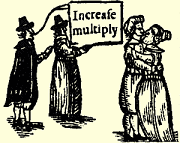 They did it the old-fashioned way, in the way they believedthey were bound by God's first command to human beings: "So God created man in his own image, in the image of God created hehim; male and female created he them. And God blessed them, and God said untothem, Be fruitful, and multiply, andreplenish the earth, and subdue it: and have dominion over the fish of thesea, and over the fowl of the air, and over every living thing that moveth uponthe earth." Genesis1:27-28
Adam slept with Eve his wife. Sheconceived
and had Cain. She said,"I've gotten a man, with God'shelp!" Genesis4:1
They did it the old-fashioned way, in the way they believedthey were bound by God's first command to human beings: "So God created man in his own image, in the image of God created hehim; male and female created he them. And God blessed them, and God said untothem, Be fruitful, and multiply, andreplenish the earth, and subdue it: and have dominion over the fish of thesea, and over the fowl of the air, and over every living thing that moveth uponthe earth." Genesis1:27-28
Adam slept with Eve his wife. Sheconceived
and had Cain. She said,"I've gotten a man, with God'shelp!" Genesis4:1
Published on January 02, 2012 23:24
December 21, 2011
Mary Dyer and Christmas
© Christy K. Robinson
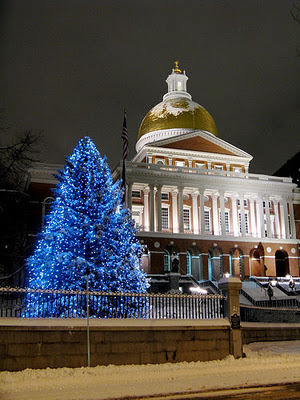 Governors Winthrop, Dudley, and Endecott
Governors Winthrop, Dudley, and Endecott would be apoplectic if they could
see Boston at Christmas today.
(Massachusetts State House)Mary Dyer was born and lived in London and may have enjoyed the Christmas season'sfestivities in her youth, when King James and King Charles I reigned over England and Scotland. Even for Church ofEngland adherents, it was rather quiet and sober during the four weeks ofAdvent, similar to Lenten season, but after the church service on Christmasmorning came the feasting. The twelve days that followed Christmas, culminatingin Epiphany or Twelfth Night on January 6, were filled with revelry,gift-giving, drinking, dancing, and entertainment such as comedy or drama playsor masques. (Masques were interactive musical plays that often had a theme ofhumanistic heroism apart from religion.) The rigid puritans disapproved of all suchfrivolous activities.
When, at age 24, Mary and herhusband William moved to puritan Massachusetts Bay Colony, there would havebeen no celebrations, feasts, gift-giving, decorating with greenery, orsinging. Candles were expensive. Under puritan rule, Christmas celebrationswere forbidden for their origins in pagan Germanic and Norse Yule, Roman Saturnalia,the winter solstice and its free-range spirits—and Catholic mass.
The puritans believed that theearly Catholic church had sold its soul for large numbers of tithe-payingconverts by placing their festivals of Christmas (winter), Easter(spring/fertility), and saints' feast days (the six-week intervals betweensolstice and equinox) in conjunction with pagan astrological and seasonaldates. A fair number of modern fundamentalist Christians feel the same way.They say that Christmas was not Jesus' birthday, and there's no evidence thathe or anyone else in the Bible celebrated birthdays.
In nearby Plymouth Colony, thecelebration of Christmas Day was forbidden, and work went on as usual onDecember 25. On Christmas and Easter,the churches of Massachusetts often declared fasts, not feasts, wherein they examined themselvesfor unconfessed sin.
During the Dyers' Rhode Island years(1638-1660), religious holidays were subdued or nonexistent. In the early1650s, in England,Mary became a Quaker Friend when the movement was new; there are no statementsfrom George Fox, the founder of the movement, that they considered Christmasdifferently than any other day of the week or year. Keep in mind that in the1640s, the puritan government that had beheaded King Charles I and waged war inEngland, Scotland, and Ireland,had outlawed holidays like Christmas and Easter, so that when Mary Dyer was in England in the50s, it must have been an unremarkable day to any religious group.
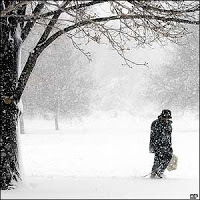 After she came back to America, the radical puritans of Massachusetts Bay took another step to enforce the bah-humbug-on-Christmas:Gov. John Endecott and his court passed a law in 1658 that fined offenders fiveshillings (worth three days of a craftsman's wages) for Christmas revels.
After she came back to America, the radical puritans of Massachusetts Bay took another step to enforce the bah-humbug-on-Christmas:Gov. John Endecott and his court passed a law in 1658 that fined offenders fiveshillings (worth three days of a craftsman's wages) for Christmas revels. In Rhode Island, the colonists held a varietyof religious beliefs and practices. The Baptist church was gaining members, buttheir first believers had been a part of Anne Hutchinson's antinomian movementand probably had no Christmas traditions to long for or rebel over! By royal chartergranted to Rhode Island,there was no government-established or sponsored religious denomination. Thefirst Quakers arrived in Rhode Island lessthan a year before Mary returned from England. One is left to concludethat there were no Christmas celebrations during the colonial years.
Even so, there was no lack ofspiritual fervor in any of the religious groups, whether long-established oramong the dozens of sects springing up in the seventeenth century. There was nodoubt in their minds that Jesus had grown up, and was no longer "Baby Jesus."
The idea that Jesus was the"Seed of Abraham" was a key belief to George Fox and the early Quakers, whoquoted Galatians 3:16: Thepromises were spoken to Abrahamand to his seed. Scripture doesnot say "and to seeds," meaningmany people, but "and to your seed,"meaning one person, who is Christ.
A few verses along, in Galatians3:29, the apostle Paul wrote, Ifyou belong to Christ, then you are Abraham'sseed, and heirs according to thepromise.
 Mary Dyer, in her 1659 letterfrom prison to Gov. Endecott and the MassBay court, spoke of the Seed as theFriends who belonged to Christ. Because of his death on the cross, believershave inherited the promises of intimacy with God here in this world, and for eternity.For God did not send his Son intothe world to condemn the world, but to save the world through him. John3:17
Mary Dyer, in her 1659 letterfrom prison to Gov. Endecott and the MassBay court, spoke of the Seed as theFriends who belonged to Christ. Because of his death on the cross, believershave inherited the promises of intimacy with God here in this world, and for eternity.For God did not send his Son intothe world to condemn the world, but to save the world through him. John3:17And if you have that assurance, as Mary Dyer did, thereis a Light, the Lightof the World, that illuminates every corner and banishes the darkness.
A happy Christmas to you (from me, Christy), and may your year ahead befilled with light, love, and peace. I'm sure Mary would hope the same for you!
Puritans and Christmashttp://en.wikipedia.org/wiki/Christmas_in_Puritan_New_Englandhttp://www.aclu.org/christmas/xmas_puritans.html
Friends (Quakers) and Christmashttp://www.quakerinfo.com/quakxmas.shtml
Published on December 21, 2011 20:45

